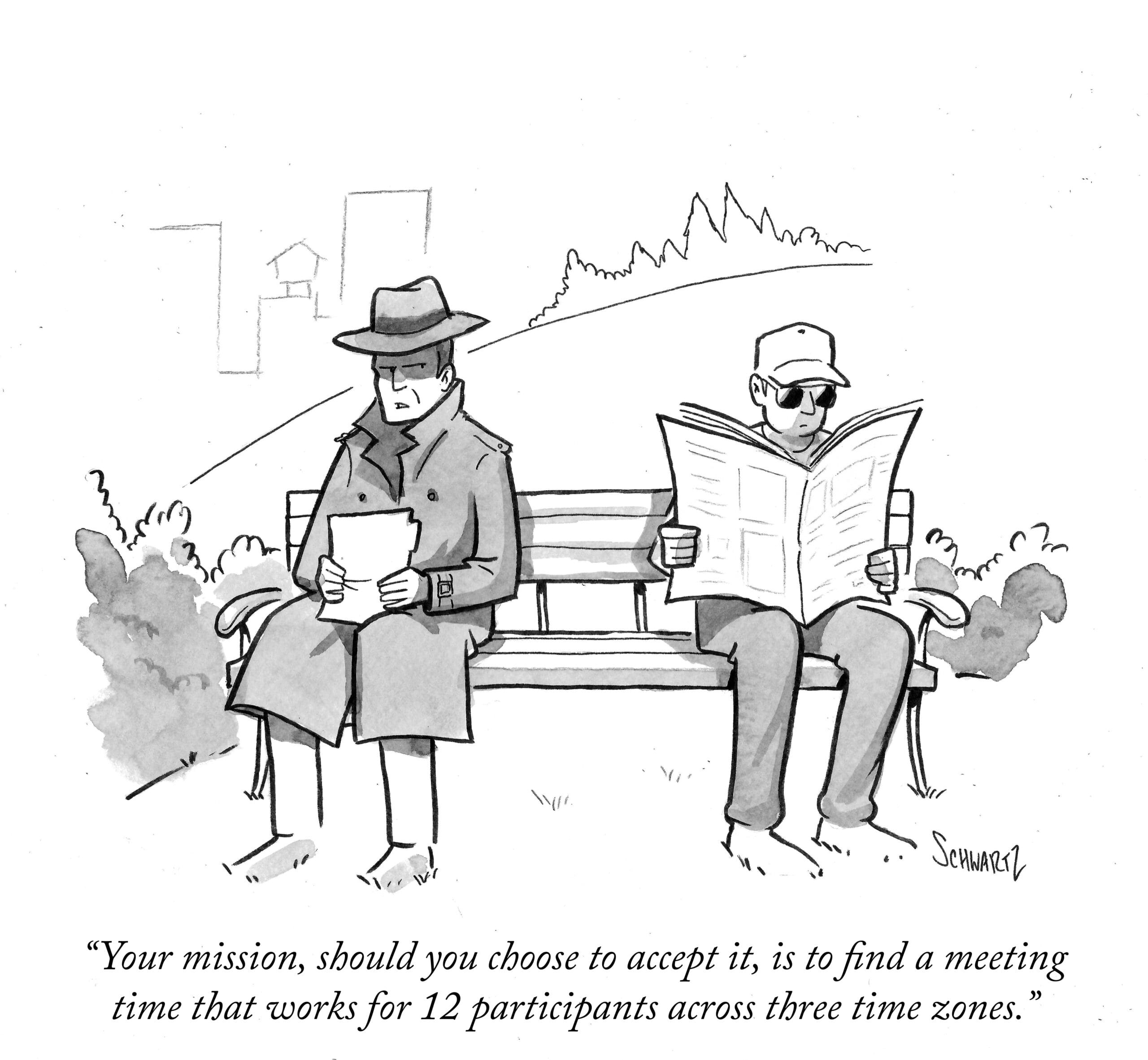Workplace trends
Relaxed Fridays seem to be driving productivity
The four-day workweek has become an increasingly common topic in the business world, with multiple trials demonstrating the boosted efficiency that can result from this arrangement. Microsoft Japan, for example, says its workforce was 40% more productive with the four-day workweek, and fintech startup Bolt recently reported that the four-day model made their employees 90% more efficient. That said, most companies are sticking with the five-day arrangement, leading many employees to fully commit to ‘Relaxed Fridays’. While Fridays have long been the day to dress down and stretch out the end-of-week lunch hour, even pre-pandemic, nowadays the average time employees are clocking out of work is 4:03 pm – a full hour earlier than they did in 2021, according to a study by analytics firm ActivTrak. And while one might assume that this would cause an overall drop in productivity, evidence suggests that taking it easier on the last day of the week not only avoids employee burnout, it actually enhances performance.
Most of the jobs we have today did not exist before 1940
A new study of U.S. jobs has revealed that most of the occupations we see today only emerged in recent decades. The research, led by MIT economist David Autor, found that six out of ten modern careers didn’t even exist 80 years ago. As expected, many new jobs have developed alongside emerging technologies, like “Engineers of computer applications” which only became a U.S. job category in 1970. The study also points to the wants and needs of consumers as a key driver of new occupations. For example, tattoo artists came around in 1950, hypnotherapists popped up in 1980, and conference planners were only categorized in 1990. Now, as we enter the age of Artificial Intelligence, experts expect an influx of new jobs to be just around the corner.
The AI corner
AI can mimic voices, but not everyone can use it
OpenAI announced the upcoming release of Voice Engine, a text-to-speech AI model that can recreate someone’s voice based on a mere 15-second recording. The company has emphasized a range of benefits that come with this new tool, from providing reading assistance through familiar-sounding voices to supporting non-verbal individuals with personalized speech options to enabling creators to translate their content while preserving their native accents. That said, OpenAI recognizes the risk of offering the public the ability to convincingly clone someone’s voice, including phone scams and election campaign robocalls, which is why despite announcing the new tool, the company has vastly limited its availability until it figures out how to safely deploy synthetic voices to a larger audience.
Economists aren’t convinced that AI is driving business productivity
Major companies are continuing to invest heavily in AI in a bid to improve performance and customer experience. Walmart has integrated generative AI into the company’s employee app to summarize meeting notes and assist in writing job descriptions, while Ben & Jerry’s embeds AI into the freezer cameras at grocery stores to sound the alarm when a location runs low on Cherry Garcia or Chunky Monkey. And while some economists believe these investments will pay off and save workers 20% of their time in about 80% of occupations, per analysts at Vanguard, not all share this outlook. In fact, there is growing skepticism among a number of economists who emphasize the lack of concrete evidence demonstrating AI’s productivity gains. Many contend that AI merely replicates tasks already achievable through software.
The right way to let an employee go
By monday.com
Last week’s newsletter delved into the difficult question of when it’s time to fire someone on your team. And while it’s important to understand the ‘when’, understanding the ‘how’ is a must, because the way you go about it can completely dictate the terms you end on and the way your remaining team members feel after the fact.
With those who are let go still serving as brand ambassadors for your organization, it’s crucial to try and leave on respectful terms to avoid animosity and tension. And at the same time, the way things are left with that team member will directly affect the sentiment, experiences, and turnover of those who remain on your team.
So here are some tips to navigating the process of letting an employee go.
Be transparent
As noted last week, it’s important to lead with transparency in performance-related meetings and, when relevant, throughout the actual process of firing a team member to ensure nothing comes as a shock or suggests unfair treatment. From the first conversation about how their future at the company is in question to later conversations about the actual firing process, as best you can, try to be open and straightforward. In the initial talks, explain exactly what your concerns are and where you would need to see fast improvement, and at the later stages, walk them through how the process is going to look, and give them the space to ask questions or get clarification to make sure they have the clarity they need.
It’s important to note, however, that there may be certain cases in which something happens, and you can’t give the employee the same kind of transparent heads up that they are going to be let go. In those instances, the process will inherently look different. That said, unless it’s those more extreme circumstances, the general rule of thumb is that no one should really be surprised by a termination for performance if the management process had been working as it should.
Lead with empathy
Recognize that this process can be really difficult for the team member being let go. Even if they saw it coming, the experience can still feel extremely painful and disappointing, especially as the more technical contractual steps come into play. So, as best you can, lead with empathy and understanding. Just like in any breakup, it’s natural for this person to feel anger and resentment, so try not to take it personally or respond defensively. As the HR and legal teams get looped in, your role should be serving as more of a sounding board than anything else. Make space for your team members to express their feelings and frustrations with you, emphasizing that you hear them and still care about them.
Choose your words carefully
For legal reasons, when you let someone go, you have to be careful about how you speak about it with the rest of the team. Your remaining employees may become concerned about their own job security or feel a sense of distrust, so do your best to address potential questions from the get-go and offer assurance when possible, even when you have to be weary of disclosing confidential information. Additionally, for the sake of their reputation, some team members who are fired may prefer you use language that suggests it was a mutual decision. If you get the approval to do so, respect their request and try to frame it as such with the rest of the team.
Similarly, be sure to speak kindly about the person, regardless of how your team members felt about them, to ensure professionalism. Especially when more beloved employees are let go, it’s helpful to acknowledge the value they brought to the team and express that while this was the right decision for the business, this person will certainly be missed.
Consider team priorities
When someone leaves your team, it’s often expected that your remaining employees pick up the slack, especially if you don’t plan to hire a replacement any time soon, which can be very stressful for those who already have a lot on their plates. That’s why these changes present an important opportunity to reflect on your team’s workload and priorities. As you prepare for the employee’s departure, take some time to dig into how much capacity everyone on your team has, and evaluate each individual’s responsibilities to determine what should be prioritized and what can be temporarily put aside. Not every project actually needs to be picked up, so choose carefully and try to distribute the work according to individual capacity and skill set.
Additionally, remember to openly communicate this approach to your team. This helps them feel confident that you’re consciously trying to ensure they don’t get swamped with tedious work. And if you’re planning to hire a replacement in the coming months, be transparent with them about the expected timeline and about which projects will be handed over to that later joiner.
Check in
Changes like these can be difficult, so after announcing an employee’s departure, schedule some one-on-one time with each of your remaining team members to check in. Everyone likely has their own way of processing, so it’s important to create space for your team members to share what they’re feeling and voice any concerns or questions.
For those who seem to be having a tougher time, try to put a chat in the calendar that’s a few weeks away to follow up. By then, the initial surprise will have likely worn off and they’ll hopefully be feeling more adjusted to the new dynamic and workloads, so it’s a good time to check in, find out if their initial concerns have been resolved, and determine if any new issues have arisen that need to be addressed. In general, make it clear that you’re thinking about your team members throughout this transition to send the right message.
Water cooler chatter
McKinsey is offering UK employees nine months’ pay to leave the company. In a desperate effort to reduce staff since the hiring boom of the pandemic era, the company is offering to keep these employees on payroll while they look for new work as well as providing career coaching and admin support to staff who accept the offer.
Question of the week
Americans believe they need $1.46 million to retire comfortably. This new number, found in a recent study by Northwestern Mutual, is 15% higher than what was considered retiring in style last year and a whopping 53% more than what people believed they needed back in 2020.
Just for laughs
Last week’s answer: Around 1 in 5
This week’s question: What percent of Chinese companies have implemented AI?
Just for laughs

Scheduling a meeting across time zones – impossible
Don’t miss more quality content!

